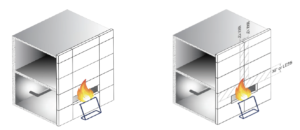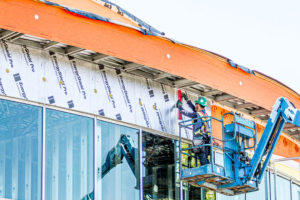Modern walls have evolved to become a complex assembly of both combustible and noncombustible materials and building codes continue to adapt to ensure that performance and safety requirements are met. The National Fire Protection Association (NFPA) provides a method for determining the flame spread characteristics of exterior wall assemblies — the NFPA 285 wall assembly test. Most commercial buildings are required to pass this test.
These proven codes and standards, combined with advances in building materials and design specifications, have significantly improved safety for occupants helping to increase time for evacuation. They also help to limit damage and reduce risk to first responders in the event of a fire. Although prevention of fire is the industry’s goal, the ability to limit the spread of flames once a fire has started will continue to be critically important.
Atlas has addressed these challenges by developing durable continuous wall insulation products that meet the highest standards of fire performance. In fact, Atlas EnergyShield Pro products are currently approved for use in more than three million NFPA 285 compliant assemblies.
How the NFPA 285 Test is Conducted
Engineered to simulate real-world conditions (for example, a multi-story hotel), the NFPA 285 test is the industry gold standard for assessing fire spread in wall assemblies.
During the test, a controlled fire is set in a two-story, full-size wall assembly model with a window opening positioned in the center of its lower floor. The fire is started on the interior of the structure, replicating the onset of most fires, then a second burner is ignited outside the window to replicate fire propagation to the exterior. The fire burns for 30-minutes, which is the estimated maximum timespan required for fire suppression crews and equipment to arrive at a building. To pass the test, the fire must stay contained both vertically and horizontally so as to not spread to another room through an exterior wall assembly as well as remain below a certain temperature.

Comparing the Fire Safety of EnergyShield Pro to EPS and XPS
Atlas offers several rigid wall insulation products for use in over 3 million different NFPA 285 compliant wall assemblies. EPS and XPS are limited in scope for use in NFPA 285 complaint assemblies, particularly in regards to cladding types, given that both EPS and XPS are thermoplastic products and susceptible to melting or burning when exposed to fire. Atlas EnergyShield Pro products are thermoset plastic, meaning they will char and stay in place, helping to limit flame spread.
Not All Insulation is Created Equal
EnergyShield Pro products not only provide superior fire safety but also offer notable jobsite benefits. While mineral wool is a popular code-compliant alternative, it is significantly heavier when compared to lightweight, easier-to-install materials like EnergyShield Pro continuous wall insulation. Furthermore, because mineral wool and similar products are not required to be NFPA 285 tested, there is no assurance that wall assemblies with mineral wool will meet the exacting standards for resistance to fire spread.
EnergyShield Pro products, on the other hand, are lightweight, have one of the highest R-value in the field, and can serve as the WRB, air, and/or vapor barrier, when installed appropriately – offering multiple advantages contained in one product.
 Keeping Up with the Times
Keeping Up with the Times
Developing products that stand up to the threat of fire will continue to remain vital for building material manufacturers. While fires will never be completely preventable, potential damage can be mitigated by controlling how building assemblies respond to fires. Specifying products like EnergyShield Pro that can be used as a part of NFPA 285 compliant wall assemblies gives architects, builders, and occupants confidence that their structures are better protected from the damaging impacts of fires.
As building code requirements for wall assemblies evolve and skilled labor force shortages continue, using a single, cost-effective product that meets multiple codes and offers jobsite efficiencies like EnergyShield Pro products will be embraced as an industry best practice. Atlas EnergyShield Pro continuous wall insulation products strong thermal performance coupled with best-in-class air, vapor, and water barrier properties offers valuable peace-of-mind for both building owners and occupants.
